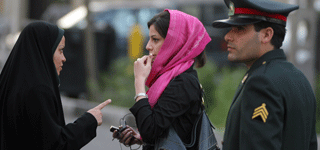 On Monday, the National Council of Resistance of Iran (NCRI), reported that, at least 30 shops, including photography shops, barber shops, and printing shops, were sealed in several cities in the Mazandaran Province (northern Iran) under the pretense that they have breached ‘Islamic codes’.
On Monday, the National Council of Resistance of Iran (NCRI), reported that, at least 30 shops, including photography shops, barber shops, and printing shops, were sealed in several cities in the Mazandaran Province (northern Iran) under the pretense that they have breached ‘Islamic codes’.
This oppressive measure was conducted in two stages in the cities of Amol, Babol and Qaemshahr on Saturday and Tuesday, by the department that supervises public places in Mazandaran. One can see this as a part of the whole banner that provides legitimacy to the current regime, where they are fuelled by their suppressive and terrorizing ways of ruling the common masses.
In the past, the Iranian regime’s ‘morality police’ shut down barber shops for reasons that included presenting “western hairstyles”, where regular checks for following the correct way of Islam were carried out by arresting women and youth on the pretext of improper clothing. Last Sunday, the public saw another one of their antics where this police arrested 21 individuals in Tehran who have been allegedly involved in the production and sale of satellite dishes and other equipment, helping Iranians watch satellite TV channels.
The head of Tehran’s morality police claimed his forces have destroyed the ‘network’ with ‘very advanced workshops’ for their production of satellite equipment. Along with intensifying the filtering of websites and social media and depriving the Iranian people of free access to the internet, the Iranian regime is increasing its crackdown on satellite channel viewers and distributors of satellite equipment.
According to the NCRI, the largest organization including democratic individuals and parties, forming the Iranian Resistance, the politically motivated crackdowns on women and youth in cities across Iran, along with public hangings, are aimed at increasing fear and intimidation in society to prevent public protests against the regime. This has grown significantly in the recent years, where many photographers, publishers and artists have been arrested and deprived of their jobs for using social networks such as Instagram and publishing their work on other social network sites.







